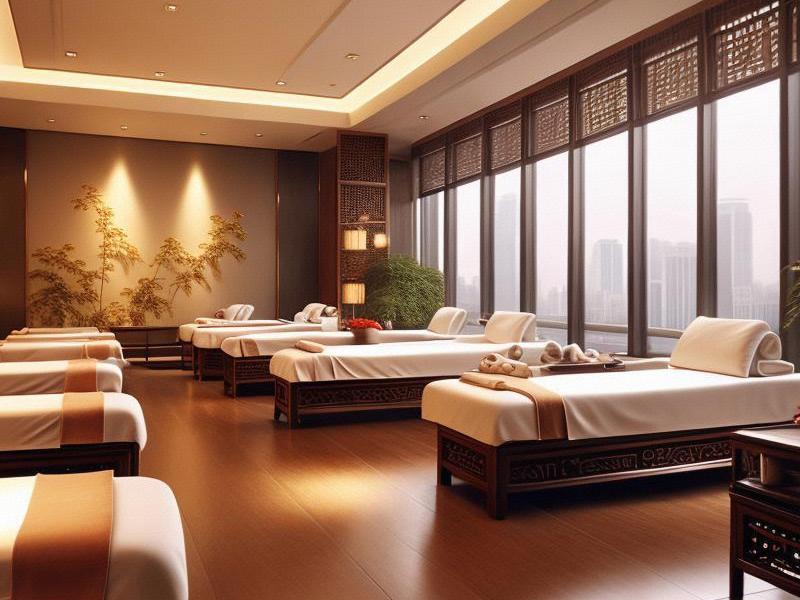
In the bustling metropolis of Shanghai, the pursuit of well - being and relaxation has become an essential part of people's lives. Chinese SPA establishments have emerged as popular destinations for those seeking a break from the fast - paced urban life.
One of the key aspects that set Chinese SPA establishments apart is their integration of traditional Chinese medicine (TCM) principles. TCM believes in the balance of yin and yang within the body, and spas often use this philosophy to design their treatment programs. For example, herbal compresses are commonly used. These compresses are made from a variety of carefully selected herbs such as mint, eucalyptus, and camphor. When applied to the body, they not only help to relieve muscle tension but also promote blood circulation. The cool or warm sensation depending on the herb used can have a soothing effect on the nervous system, reducing stress and anxiety.
Another important feature is the use of hot stones in spa treatments. In Shanghai's Chinese spas, large, smooth stones are heated to a specific temperature and then placed on different parts of the body. The heat from the stones penetrates deep into the muscles, helping to relax them and relieve chronic pain. This practice has its roots in ancient Chinese healing methods, where heat was used to unblock energy channels in the body. The combination of the warm stone and the skilled hands of the spa therapist provides a deeply relaxing experience.
阿拉爱上海 Chinese SPA establishments also offer a wide range of massage therapies. Thai - style massage, which has gained popularity in recent years, is often incorporated. This type of massage combines elements of traditional Chinese and Indian massage techniques. It involves stretching, rocking, and applying pressure to various parts of the body. The result is a full - body relaxation that not only relieves physical tension but also improves flexibility. In addition, traditional Chinese tuina massage is also available. Tuina therapists use their fingers, palms, and elbows to apply force to specific acupressure points on the body. By stimulating these points, they can regulate the body's internal organs, enhance immunity, and promote overall well - being.
The ambiance of Chinese SPA establishments in Shanghai also contributes significantly to the relaxation experience. These spas are often designed with an elegant and tranquil atmosphere in mind. Soft lighting, soothing music, and the use of natural materials such as bamboo and silk crteeaa sensory - rich environment. The scents in the spa, whether it be the faint aroma of herbal teas in the waiting area or the fragrant essential oils used during treatments, further enhance the sense of calm. For example, the smell of jasmine tea can have a calming effect on the mind, while the scent of lavender is known for its ability to relieve stress.
上海喝茶服务vx Moreover, Chinese SPA establishments in Shanghai are increasingly incorporating healthy lifestyle elements into their services. They may offer nutrition consultations, teaching clients about the importance of a balanced diet in maintaining well - being. Some spas also provide yoga and meditation classes on - site. Yoga helps to improve posture, increase strength, and reduce stress, while meditation allows people to quiet their minds and focus on the present moment. These additional services show that Chinese spas are not just about physical relaxation but also about promoting a holistic approach to well - being.
In terms of customer service, the staff in Shanghai's Chinese SPA establishments are trained to be highly professional and attentive. They take the time to understand each client's needs and preferences, customizing treatment plans accordingly. From the moment a client walks in, they are greeted with warm smiles and a sense of hospitality. During the treatment, the therapists communicate effectively, ensuring that the client is comfortable at all times.
上海龙凤419 However, like any industry, Chinese SPA establishments in Shanghai also face some challenges. One of the main issues is the need to maintain high standards of quality control. With the increasing popularity of spas, there is a risk of some establishments cutting corners in terms of the quality of their products and services. To address this, industry associations and regulatory bodies are working to establish stricter guidelines and certification processes.
Another challenge is competition. As the market for spas continues to grow, both domestic and international competitors are vying for customers. Chinese SPA establishments need to不断创新(创新 - innovate) (innovate) continuously to stay ahead. This could involve introducing new and unique treatment packages, collaborating with other wellness providers, or leveraging digital marketing strategies to reach a wider audience.
In conclusion, Chinese SPA establishments in Shanghai play a vital role in catering to people's well - being and relaxation. Through the integration of traditional Chinese medicine principles, a variety of massage therapies, a relaxing ambiance, and additional healthy lifestyle elements, they offer a comprehensive solution for those seeking to unwind and rejuvenate. Despite facing some challenges, with continuous innovation and quality improvement, these spas are likely to remain popular destinations for well - being in the future.
